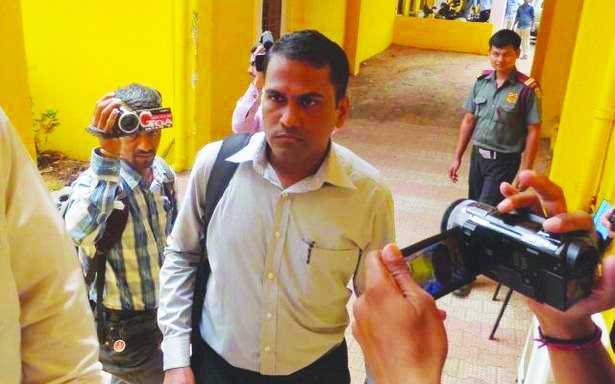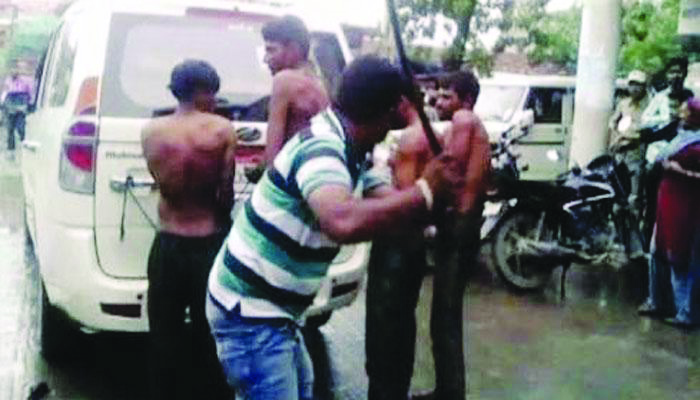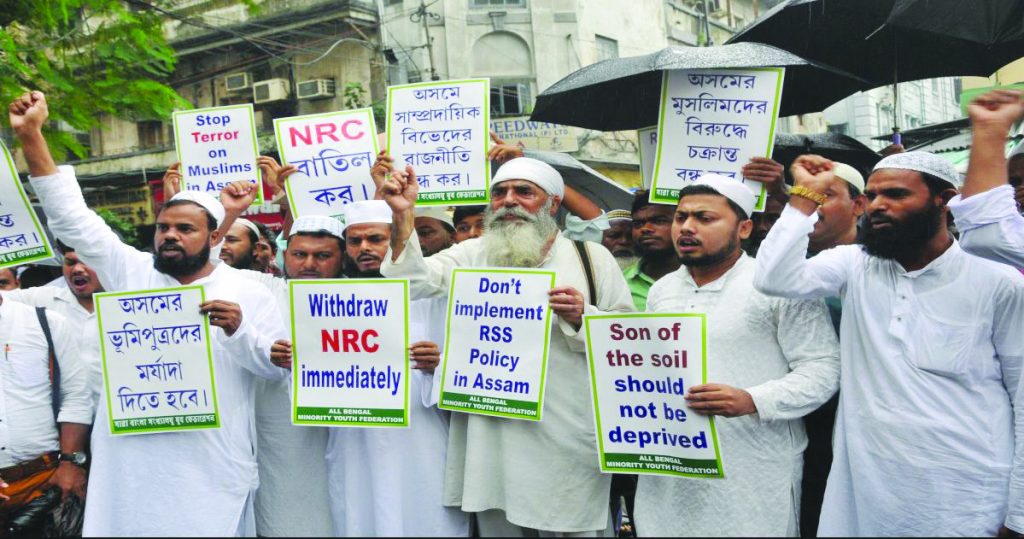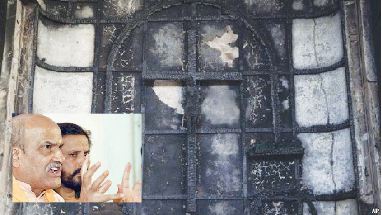INTOLERANCE: The Amit Shah kind of intolerance was demonstrated by Pramod Muthalik, whose supporters vandalised churches in Karnataka. Muthalik’s supporters also vandalised a pub and assaulted the women there and compares Gauri Lankesh’s murder to a dog’s death
GO STAFF
BJP ruled states in particular have not prevented attacks on the minority communities by so-called gau rakshaks and other fanatic groups like Karnataka leader Muthalik’s Ram Sene, and people have been harassed for merely criticising Modi
Studying the last three reports on India released by Human Rights Watch (HRW) (covering a period from 2016 to 2018) shows a pattern of government failure to control growing attacks on Dalits and religious minorities, often led by vigilante groups claiming to be supporters of the ruling Bharatiya Janata Party (BJP) (with the perpetrators sometimes even being felicitated), curbs on free speech, ill-treatment of tribal groups and crackdown on protests.
“Indian authorities have proven themselves unwilling to protect minority religious communities and other vulnerable groups from frequent attack,” said Meenakshi Ganguly, South Asia director at Human Rights Watch, in a statement in 2017, adding that “there needs to be a serious effort to prevent future attacks and to prosecute all those responsible for the violence.” Unfortunately subsequent years show that nothing has changed.
“In 2016, students were accused of sedition for expressing their views; people who raised concerns over challenges to civil liberties were deemed anti-Indian; Dalits and Muslims were attacked on suspicion they had killed, stolen, or sold cows for beef; and nongovernmental organisations (NGOs) came under pressure due to India’s restrictive foreign funding regulations,” says the 2017 report.
The HRWatch report consistently shows that the judiciary that has had to step in time after time both to protect various sections of society and to chastise authorities for misguided action or lack of required action. We bring you excerpts focused on treatment of minority groups and issues related to freedom of expression

Treatment OF Minorities
2017 Report
Hindu vigilante groups attacked Muslims and Dalits over suspicions that they had killed, stolen, or sold cows for beef. The violence took place amid an aggressive push by several BJP leaders and militant Hindu groups to protect cows and ban beef consumption.
In March 2016, a Muslim cattle trader, Mohammed Mazlum Ansari, 35, and a 12-year-old boy, Mohammed Imteyaz Khan, were found hanging from a tree in Jharkhand state, their hands tied behind their backs and their bodies bruised. In August, a man was killed in Karnataka state by members of a nationalist Hindu group while transporting cows.
In July, four men in Gujarat were stripped, tied to a car, and publicly beaten with sticks and belts over suspicions of cow slaughter.
The government’s continuing failure to rein in militant groups, combined with inflammatory remarks made by some BJP leaders, has contributed to the impression that leaders are indifferent to growing intolerance.
A 2016 report on caste-based discrimination by the UN special rapporteur on minority issues noted that caste-affected groups continue to suffer exclusion and dehumanization. In January, the suicide of Rohith Vemula, a 25-year-old Dalit student, drew renewed attention to entrenched caste-based discrimination in Indian society, and sparked nationwide protests by students and activists calling for reforms in higher education.
In June, a special court in Gujarat convicted 24 people for their involvement in the mass killing of 69 people by a Hindu mob in Gulberg Society, a Muslim neighbourhood in Ahmedabad, during the 2002 Gujarat riots. While pronouncing the verdict, the court called the killings the “darkest day in the history of civil society.” But some victims’ families, lawyers, and rights activists criticised the acquittals of senior BJP leaders and a police official.
Several cases of lynchings made headlines throughout the year where the victims were mostly Muslims. One of the cases of communal violence came to light in early December when a migrant Muslim labourer from West Bengal was hacked to death and burnt by Shambhu Lal Regar, who alleged him of carrying out “love jihad.”So-called love jihad, according to Hindu groups, is a conspiracy among Muslim men to marry Hindu women and convert them to Islam.
2018 Report
Mob attacks by extremist Hindu groups affiliated with the ruling BJP against minority communities, especially Muslims, continued all year amid rumours that they sold, bought, or killed cows for beef. Instead of taking prompt legal action against the attackers, police frequently filed complaints against the victims under laws banning cow slaughter. As of November, there had been 38 such attacks, and 10 people killed during the year.
Two people died in caste clashes between Dalits and members of an upper caste community in Uttar Pradesh in April and May. Between April and July, 39 people reportedly died from being trapped in toxic sewage lines, revealing how the inhuman practice of “manual scavenging” — disposal of human waste by communities considered low-caste — continues.
In June 2017, a fight over train seats turned ugly with religious slurs, accusations of being deshdrohi (antinational) and carrying beef triggering a mob attack on four young boys returning home from Eid shopping in which 16-year-old Junaid was killed.

In July, even after Prime Minister Narendra Modi finally condemned such violence, an affiliate organization of the BJP, the Rashtriya Swayamsevak Sangh (RSS), announced plans to recruit 5,000 “religious soldiers” to “control cow smuggling and love jihad.”
2019 Report
Mob violence by extremist Hindu groups affiliated with the ruling BJP against minority communities, especially Muslims, continued throughout the year amid rumours that they traded or killed cows for beef. As of November, there had been 18 such attacks, and eight people killed during the year.
In July, the government in Assam published a draft of the National Register of Citizens, aimed at identifying Indian citizens and legitimate residents following repeated protests and violence over irregular migration from Bangladesh. The potential exclusion of over four million people, many of them Muslims, from the register raised concerns over arbitrary detention and possible statelessness.
Dalits, formerly “untouchables,” continued to be discriminated against in education and jobs. There was increased violence against Dalits, in part as a reaction to their more organized and vocal demands for social progress to narrow historical caste differences.
In April, nine people were killed in clashes with police after Dalit groups protested across several north Indian states against a Supreme Court ruling to amend the SC & ST (Prevention of Atrocities) Act. In response to a complaint of alleged misuse of the law, the court had ordered that a senior police official should conduct a preliminary inquiry before a case is registered under the law. Following the widespread protests, the parliament passed amendments to the law in August, overturning the Supreme Court order.
In July, police in Ahmedabad city raided an area, home to 20,000 members of the vulnerable and marginalized Chhara tribe, a denotified tribe. According to residents, police allegedly brutally beat up scores of people, damaged property, and filed false cases against many of them.
Tribal communities remained vulnerable to displacement because of mining, dams, and other large infrastructure projects.
In September, the Supreme Court upheld the constitutionality of the biometric identification project, Aadhaar, saying the government could make it a requirement for accessing government benefits and filing income tax, but restricted it for other purposes. Rights groups raised concerns that Aadhaar registration requirements had prevented poor and marginalized people from getting essential services that are constitutionally guaranteed, including food and health care.

Freedom
India has been witness to an increasing number of attacks on press freedom and vigilante violence that targets critics of the ruling government, the BJP. All the reports echo the building concerns over the disintegrating communal harmony in the country, receding freedom of expression and the dangerous empowerment of armed personnel.
2017 Report
In Chhattisgarh, journalists, lawyers, and civil society activists faced harassment and arrest. In March, the Editors Guild of India reported that media in Chhattisgarh state were “working under tremendous pressure” from authorities, Maoist rebels, and vigilante groups.
In August, the Supreme Court declared the right to individual privacy “intrinsic” and fundamental under the country’s constitution, and emphasised the constitution’s protections, including free speech, rule of law, and “guarantees against authoritarian behaviour.”
Authorities continue to use sedition and criminal defamation laws to prosecute citizens who criticize government officials or oppose state policies. In a blow to free speech, the government in 2016 argued before the Supreme Court in favour of retaining criminal penalties for defamation. The court upheld the law.
In February, authorities arrested three students at the Jawaharlal Nehru University in Delhi under the sedition law for alleged anti-national speech, acting on complaints by members of the Akhil Bharatiya Vidyarthi Parishad (ABVP), the student wing of the ruling BJP. These arrests led to widespread protests over the arbitrary use of the sedition law.
In August, police in southern Karnataka state filed a sedition case against Amnesty International India based on a complaint by ABVP, alleging that anti-Indian slogans were raised at a meeting organized by Amnesty on abuses in Kashmir. Police later claimed, however, that they did not have sufficient evidence to proceed with charges. The same month, an actor-turned-politician in the state also faced sedition charges after she praised the friendship and courtesy she received in Pakistan.
In August, the Karnataka High Court called the state government “clearly paranoid” for pressing sedition charges against three people, including two former policemen, for organizing a protest seeking better police wages and working conditions.
In Chhattisgarh, journalists, lawyers, and civil society activists faced harassment and arrest. In March, the Editors Guild of India reported that media in Chhattisgarh state were “working under tremendous pressure” from authorities, Maoist rebels, and vigilante groups.
The Modi government continues to use the Foreign Contribution Regulation Act (FCRA), which regulates foreign funding for civil society organizations, to cut off funds and stymie the activities of organizations that question or criticize the government or its policies. In April 2016, Maina Kiai, the UN special rapporteur on freedom of assembly and association, analyzed the FCRA and said that restrictions imposed by the law and its rules “are not in conformity with international law, principles and standards.”
In May, the government temporarily suspended the FCRA status of the Lawyers Collective, an organization founded by Indira Jaising, a former additional solicitor general, and her husband, Anand Grover, a former UN special rapporteur on the right to health. The Lawyers Collective accused the government of attempting to disempower and weaken the organisation because of its work assisting people in cases challenging Modi government policies. In June, three UN special rapporteurs released a statement raising concerns over the suspension and calling on the government to repeal FCRA. In November, the government refused to renew FCRA for 25 NGOs, including several prominent human rights groups.
Even as authorities were using FCRA to tighten restrictions on NGOs, the government amended the law in March to retroactively legalize funding by foreign entities to political parties.
Threats of legal action and arbitrary corruption investigations put increasing pressure on journalists and media outlets to self-censor.
2018 Report
Authorities in India continued to use sedition and criminal defamation laws against government critics.
In March, authorities in Maharashtra state charged a journalist for spying and criminal trespass for reporting that officers improperly used subordinates for personal work, filming on army premises without permission, and using a hidden camera.
In June, police in Madhya Pradesh state arrested 15 Muslims on sedition charges for allegedly celebrating Pakistan’s victory over India in a cricket match, despite Supreme Court directions that sedition allegations must involve actual violence or incitement to violence. After a public outcry, the police dropped the sedition case but charged them with disturbing communal harmony. Also, in June, the Karnataka state assembly punished two editors for articles that allegedly defamed two of its members.
Journalists faced increasing pressure to self-censor due to threat of legal action, smear campaigns and threats on social media, and even threats of physical attacks. In September, unidentified gunmen shot dead publisher and editor Gauri Lankesh, a vocal critic of militant Hindu nationalism, outside her home in Bengaluru.
State governments resorted to blanket internet shutdowns either to prevent violence or social unrest, or to respond to an ongoing law and order problem. By November, they had imposed 60 internet shutdowns, 27 of these in Jammu and Kashmir. In August, the government issued rules to govern temporary shutdown of the internet and telecommunications services in the event of “a public emergency or public safety [issue].” However, the rules do not specify what the government considers to be a public emergency, or a threat.
Activists and human rights defenders faced harassment including under the FCRA, which governs access to foreign funding for NGOs. In April, the government cancelled the FCRA license of the Public Health Foundation of India (PHFI), one of country’s largest public health advocacy groups, accusing it of diverting foreign funds to lobby parliamentarians, media, and the government.
Although FCRA may be revoked if the groups violate procedures laid down in the law, the government’s political motivations became evident after the Centre for Promotion of Social Concerns (CPSC) challenged the government’s decision in the Delhi High Court. A January 2017 government affidavit in response accused CPSC of using foreign funding to share information with United Nations special rapporteurs and foreign embassies, “portraying India’s human rights record in negative light.”
In November 2016, India’s National Human Rights Commission questioned the government’s decision not to renew the FCRA for CPSC and concluded: “Prima-facie it appears FCRA license non-renewal is neither legal nor objective.”
2019 Report
Authorities continued to use laws on sedition, defamation, and counterterrorism to crack down on dissent.
In April, police in Tamil Nadu state arrested a folk singer for singing a song at a protest meeting that criticized Prime Minister Narendra Modi. In August, state authorities detained an activist for sedition, allegedly for describing police abuses against protesters opposing a copper factory at the UN Human Rights Council. When a magistrate refused to place him in police custody, police arrested him in an older case and added sedition to the charges against him. Police have also added charges under the Unlawful Activities Prevention Act (UAPA), the key counterterrorism law.
In June, police arrested eight people in Bihar state, including five under the age of 18, for sedition, for playing and dancing to an “anti-India” song.
In September, Tamil Nadu state authorities arrested a woman for calling the BJP government “fascist” on board a flight in the presence of the state’s BJP president.
Journalists faced increasing pressure to self-censor due to threat of legal action, smear campaigns and threats on social media, and even threats of physical attacks. In August, the government withdrew its controversial proposal to monitor social media and online communications and collect data on individuals after the Supreme Court said it would turn India into a “surveillance state.”
State governments resorted to blanket internet shutdowns either to prevent violence and social unrest or to respond to an ongoing law and order problem. By November, they had imposed 121 internet shutdowns, 52 of them in Jammu and Kashmir and 30 in Rajasthan.
Authorities increasingly used the Unlawful Activities Prevention Act to target civil rights activists and human rights defenders. Police in Maharashtra state arrested and detained 10 civil rights activists, lawyers, and writers, accusing them of being members of a banned Maoist organization and responsible for funding and instigating caste-based violence that took place on January 1, 2018. At time of writing, eight of them were in jail, and one was under house arrest. A fact-finding committee, headed by Pune city’s deputy mayor, found that the January 1 violence was premeditated by Hindu extremist groups, but police were targeting the activists because of pressure from the government to protect the perpetrators.
In Manipur state, police threatened and harassed activists, lawyers, and families pursuing justice for alleged unlawful killings by government security forces.
The Indian government also continued to use the FCRA to restrict foreign funding for NGOs critical of government policies or protesting the government’s large development projects. Cases filed by NGOs challenging government decisions to suspend or cancel their FCRA were pending in court.
Courtesy: https://www.hrw.org
